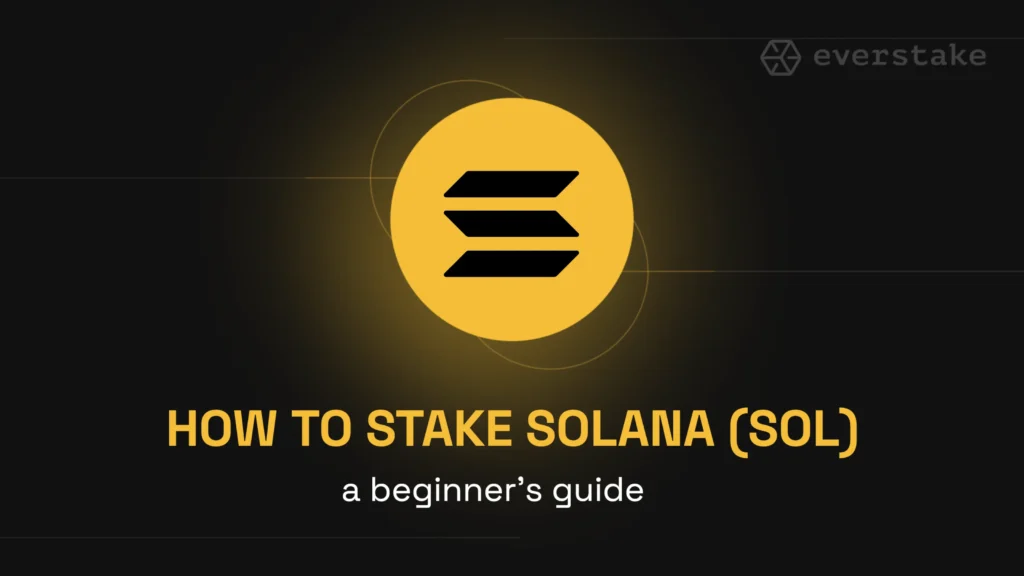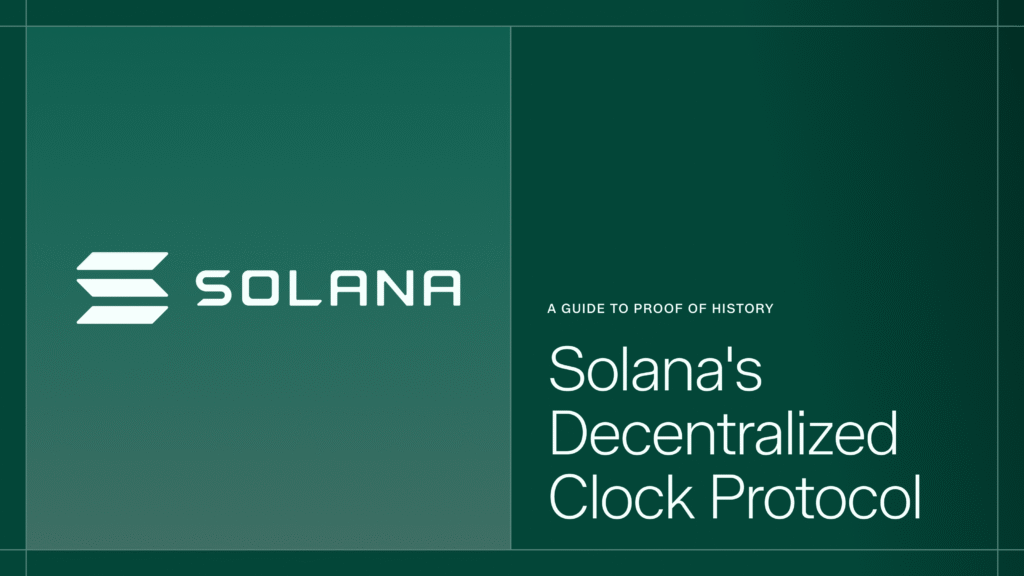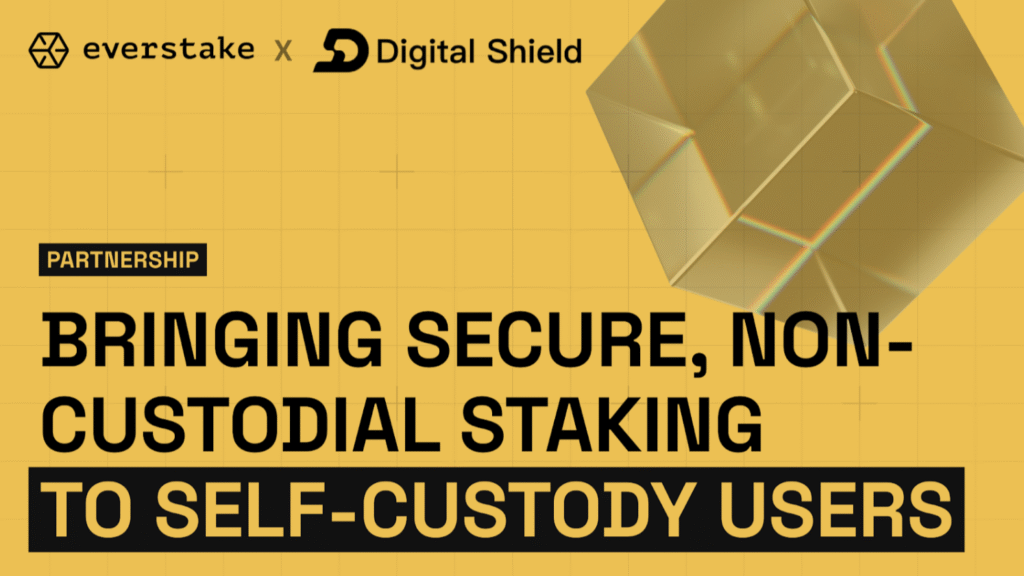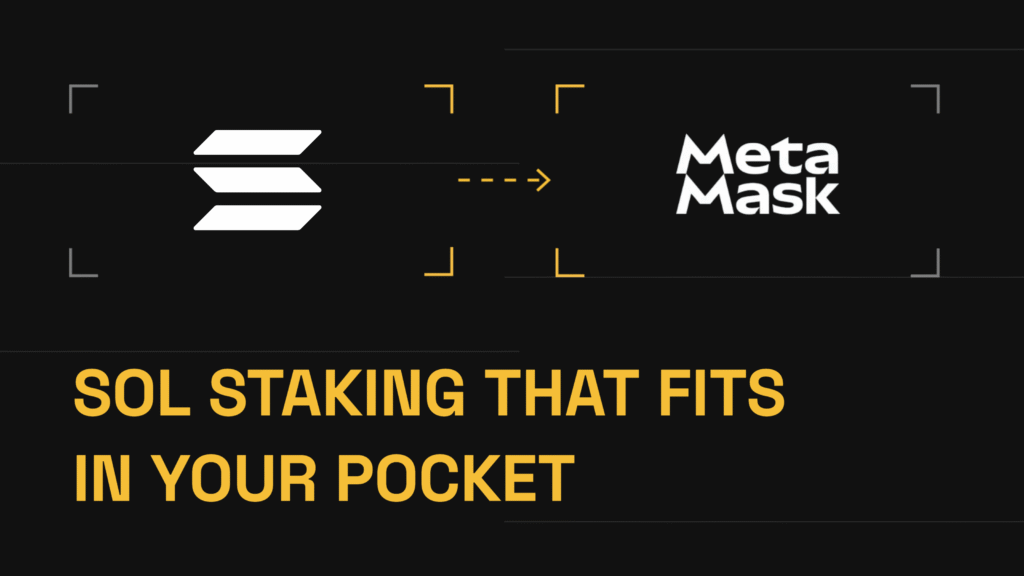
solana
How to Stake Solana SOL: a Beginner’s Guide
Learn how to stake SOL on the Solana Blockchain with our comprehensive guide. Follow our step-by-step instructions and start earning rewards today. Find out everything you need to know about Solana staking and maximize your returns.
MAY 16, 2023
Table of Contents
What is the Solana blockchain
What is the Solana SOL token
What is Solana (SOL) staking
Main features of Solana (SOL) staking
How to track SOL staking rewards
Where to stake Solana SOL?
Wallets for Staking Solana (SOL)
How to stake Solana (SOL)
A step-by-step guide to staking Solana (SOL)
Why Stake Solana (SOL) with Everstake?
FAQ
Share with your network
Well known for its impressive transaction speeds, affordable transaction fees, and developer-friendly environment, Solana has carved out a significant position in the digital currency domain as a leading blockchain network. An essential aspect of the Solana ecosystem is its staking mechanism, enabling users to help secure the network and receive rewards in the process. With the increasing interest in staking SOL, Solana’s native digital currency, more users are adopting it as a method for earning passive income and simultaneously supporting the network’s progression and enlargement.
In this article, we will explore the main aspects of Solana staking, understand its operations, and what you need to start staking.
What is the Solana blockchain
Solana is a high-performance blockchain designed to support decentralized applications and enable fast and low-cost transactions. A team of software engineers and developers, under the guidance of Anatoly Yakovenko, launched Solana in March 2020.
Solana uses a unique consensus algorithm called Proof-of-History (PoH). This is a cryptographic technique that enables the network to generate a verifiable and auditable record of the order and timing of events that occur within the blockchain. The basic idea behind PoH revolves around employing a cryptographic clock that assigns a distinct and sequential timestamp to every transaction or event within the network. This clock is maintained by a set of validators who use their computing power to perform computations that generate timestamps.
Solana’s key features:
High performance: Solana is designed for high performance and scalability. This enables it to process up to 65,000 transactions per second (TPS). Compared to other blockchains, this is significantly higher. To put this into perspective, Ethereum can only process about 15 TPS, Cosmos (10,000 TPS), Avalanche (4,500 TPS) and Cardano (270 TPS).
Low transaction costs: Solana has extremely low transaction fees. The average transaction fee on Solana is around $0.00025, which is significantly lower than other networks.
Developer-friendly: Solana is built using the Rust programming language, which is well-known for its speed, safety, and performance. This makes it easier for developers to build decentralized applications (dApps) on the Solana network.
Cross-chain interoperability: Solana has introduced several cross-chain bridges, such as Solana Wormhole, which allow users to transfer assets between different blockchain networks. This interoperability enables Solana to work seamlessly with other networks and brings up new use cases and opportunities for developers.
What is the Solana SOL token
Solana (SOL) is a cryptocurrency token that powers the Solana blockchain. The Solana blockchain is a high-performance blockchain that uses a unique proof-of-stake consensus mechanism to achieve fast transaction processing and high throughput. SOL is used for a variety of purposes within the Solana ecosystem, including:
Payment for transaction fees: SOL is used to pay for transaction fees on the Solana network. This incentivizes validators to process transactions quickly and accurately.
Governance: SOL holders can vote on changes to the Solana protocol and participate in decision-making processes that shape the future of the network.
Staking: SOL holders can stake their tokens to earn rewards and help secure the Solana network.
Token swaps: SOL can be used as a medium of exchange for swapping other cryptocurrencies on decentralized exchanges that operate on the Solana network.
SOL has become increasingly popular as more developers and projects build on the Solana blockchain, and its price has experienced significant growth in recent years. As with all cryptocurrencies, the value of SOL can be volatile and subject to fluctuations based on market demand and other factors.
What is Solana (SOL) staking
Solana (SOL) staking is the process of holding and locking up Solana’s native cryptocurrency, SOL, to help secure the network and earn rewards in return. By staking (delegating) SOL to trusted network validators, users contribute to the network’s consensus process and receive incentives for doing so.
Validators are the entities or individuals that run a node(s) in order to sign the network blocks. In Solana, in order to participate in consensus, the validator operates a voting account and sends a vote transaction for each block he agrees with. While Validators serve as the backbone of the network, the Delegators are the users who actually support the network decentralization, secure its work and assist its ecosystem growth by delegating their SOL tokens to validators. In Solana, delegation is an integral part of the staking process.
Staking has the unique characteristic of encouraging individuals to hold onto their digital currency instead of trading it. This helps to reduce the volatility and increase the stability of the staked cryptocurrency in the market. Moreover, staking rewards usually provide higher returns compared to traditional savings accounts, making it an appealing option for those seeking to generate passive income. In Solana, the APR at the moment is >7% (the actual network APR can be tracked on Solana Beach).
Main features of Solana (SOL) staking
Solana (SOL) delegation is a process that enables users to delegate their SOL tokens to validators on the Solana network. By delegating SOL, users participate in staking without having to operate their own validator node.
Epochs
The network is divided into epochs, which are periods of time during which the network reaches a consensus on a set of transactions. The duration of one epoch is approximately 2-3 days. Check the epoch’s length on Solana Beach or any other Solana explorer.
Activating/deactivating period
A delegation or deactivation takes one epoch to complete, with the stake being activated or deactivated at each epoch boundary following the submission of the transaction that includes the instructions to the cluster. Additionally, there is a restriction on the amount of total stake that can be delegated or deactivated during a single epoch to avoid significant and abrupt changes in the network’s overall stake (for an average user, there is no need to worry about this limitation).
Staking account
When delegating tokens to validators on the Solana network, the owner of a stake account will earn staking rewards. It’s important to note that stake accounts differ from traditional wallet addresses, known as system accounts, in terms of their creation and management. System accounts can only send and receive SOL from other accounts on the network, while stake accounts allow for more complex operations required to manage token delegation.
Please note that a stake account can only be used to delegate tokens to a single validator at any given time.
Additionally, all tokens within the account are either delegated, undelegated, or in the process of transitioning between the two states. The staking rewards are compounding (added to the stake each epoch). Also, it is impossible to add more stake to an existing stake account – instead, the new stake account will be created each time the user attempts a new delegation.
Validator’s fee
Validators receive a commission (fee) for the inflationary rewards earned by the stake accounts that are delegated to them. The fee is set up by every validator specifically and varies from 0 to 100% in Solana. The fee is deducted from the total rewards earned and is referred to as the commission rate in exchange for the validators’ service in securing the blockchain and processing transactions.
When network rewards are distributed, the commission is first deposited into the validator’s account, and the remaining rewards are then distributed among all the stake accounts delegated to that validator proportionally, based on the amount of actively delegated stake in each account. It’s worth noting that validator commission and staking rewards are always issued at the same time.
APY
The staking yield is typically expressed as an annualized figure, although this value can fluctuate each epoch due to changes in the inflation rate and total active stake. Users can check the current APR on Solana Compass or Solana Beach. The APY depends on the validator’s fee, uptime and performance.
How to track SOL staking rewards
Solana’s staking rewards are variable and depend on a number of factors, including the total amount of SOL staked, the number of validators on the network, and the overall demand for transaction processing. The current annualized staking rewards for Solana range from around 6% to 8%.
Once per epoch, rewards are issued and deposited into the stake account that has earned them. These rewards are then automatically re-delegated as active stake.
Our team has created an insight-packed article, How to Track SOL Staking Rewards. It can help you in solving potential issues that may arise, for instance, the wallet not displaying the rewards.
Where to stake Solana SOL?
If you’re considering staking Solana SOL, you have two main avenues: wallets or exchanges. Each has its unique advantages and considerations.
Security Considerations
Staking through a wallet is often seen as the more secure option. This is because, when staking with a wallet, you retain complete control over your funds. By contrast, staking on an exchange involves entrusting your funds to that exchange. This could potentially expose your funds to risk in the event of a security breach or if the exchange goes bankrupt.
It’s worth noting that during the delegation process in wallet staking, your funds stay in your wallet and are locked by the network’s smart contract to participate in block validation.
Reward Potential
Another important factor is the potential for rewards. Typically, staking with a validator (through a wallet) provides higher rewards compared to exchanges. This is due to lower commission fees charged by validators, which results in a larger portion of staking rewards being distributed to stakers.
Performance and Uptime
The validator cares about performance and uptime because his income and work depend on these factors heavily. On the other hand, exchanges usually offer staking as an additional service and do not rely on it as the main service/source of income. Instances have been reported where exchange nodes experienced substantial downtime—ranging from several hours to days—causing them to miss participation in network consensus.
This situation can potentially pose a risk to the network’s health. One such case has been documented on Everstake’s Twitter account.
Flexibility
When staking with an exchange, the delegator is often required to meet specific conditions, such as a minimum staking amount or a lock-up period. In contrast, staking with a validator is more flexible as the user can choose the validator that offers the terms that best suit his/her needs. Solana has an instant unstake option which does not require you to wait for the deactivating period to run out when delegating via wallets. This instant unstake feature is made possible via resources like unstake.it or when delegating to stake pools.
Wallets for Staking Solana (SOL)
Here’s a list of the wallets you can use to stake SOL.
Phantom
Phantom wallet provides an easy-to-use interface with features such as staking, token swapping, and NFT support. One of the notable features of Phantom Wallet is that it enables users to connect easily with decentralized applications (dApps) built on the Solana blockchain. Even better, Phantom recently went multichain!
Here’re our guides to help you figure things out on how to stake SOL via the Phantom wallet:
How to Stake Solana (SOL) using Phantom Wallet
How to Stake SOL Using Phantom Wallet iOS App
How to Stake Solana SOL via Phantom Web Wallet (video guide)
Store & Stake Solana (SOL) in the Phantom Wallet via Ledger
Solflare
Solflare supports staking for Solana and was the first Solana wallet. With Solflare, users have total control over their private keys, which ensures that they have full custody of their funds. Solflare also supports Ledger on both the web and mobile.
Our guides:
How to Stake Solana (SOL) in the Solflare Web Wallet
How to Stake SOL using Solflare Mobile Wallet
How to Stake SOL using Solflare Mobile Wallet (video guide)
How to Stake SOL in the Solflare Wallet via Ledger
Exodus
Exodus wallet is a multi-cryptocurrency application that allows users to store, manage, stake and exchange various cryptocurrencies. Available across desktop, mobile, and hardware platforms, the wallet prioritizes user security through robust encryption and backup features to protect digital assets. As one of the pioneers in integrating Solana, Exodus also offers support for Ledger.
Our guides:
How to Stake Solana via Exodus Chrome Extension
How to Stake SOL in the Exodus Desktop Wallet: a Beginner’s Guide
How to Stake SOL in Exodus Mobile Wallet
Trust Wallet
Trust Wallet is a decentralized, non-custodial, multi-cryptocurrency wallet application that empowers users with full control over their digital assets (cryptocurrencies and non-fungible tokens)
Our guide:
Slope
Slope is a web-based cryptocurrency wallet and browser extension that allows you to safely manage assets on the Solana blockchain.
Our guide:
Savl
Savl is a Web3 and self-custodial wallet that serves as a secure entry point for buying, sending, receiving, swapping, and storing more than 250 leading cryptocurrencies and tokens.
Our guide:
Trustee
Trustee is an advanced cryptocurrency wallet that enables users to buy and sell crypto through VISA or Mastercard, while offering the highest level of security to manage their assets. With Trustee, users can avoid concerns about data breaches and excessively high fees.
Our guide:
Ledger
Ledger is a hardware wallet, a portable device designed to securely store and manage private keys needed to access a variety of digital assets. The Ledger wallet uses a combination of advanced security features, such as secure chips and encryption, to protect users’ private keys and ensure that their digital assets are safe from theft or hacking attempts. It is the most popular choice for individuals who want to store their digital assets offline and away from potential online threats.
Our guides:
How to Stake SOL in the Solflare Wallet via Ledger
Store & Stake Solana (SOL) in the Phantom Wallet via Ledger
CoolWallet
CoolWallet is another hardware wallet that leverages cutting-edge security technologies such as military-grade Bluetooth connection (AES 256) and biometric verification. It features an EAL6+ secure element that securely stores the private key, ensuring that all asset withdrawals are authenticated with both the hardware wallet and a phone. This means that only the owner of the wallet can withdraw the stored assets, guaranteeing maximum security.
Our guide:
You can find other language versions (ESP, FR, TR, etc.) of our Solana staking guides on our website.
How to stake Solana (SOL)
Before you can start staking Solana, the first step is to ensure that you have a wallet where you can store the tokens. Above, we wrote about the most popular wallet options for staking SOL. You can choose the most suitable wallet for your needs.
Once you have chosen a wallet, you can deposit SOL tokens into it. You can either purchase SOL tokens within the wallet app using your bank card, or you can use the built-in exchange feature to swap other tokens for SOL.
Now that you have deposited SOL tokens into your wallet, you are ready to begin staking.
A step-by-step guide to staking Solana (SOL)
The process of staking Solana is straightforward and easy to follow. It comprises four main steps, each of which we will detail below.
Step 1. Choose a wallet
As we discussed earlier, many wallets support SOL staking. Just choose the one that suits you best, and let’s proceed.
Step 2. Choose a validator
You can find information about the number of tokens staked with each validator and their commission rates from the list of validators mentioned earlier. However, before proceeding, we suggest doing your own research on various validators, such as through validators.app.
It’s important to track the following:
validator’s performance;
total stake;
delegators;
skipped slots and votes;
APR;
commission;
social media & site.
Everstake sets itself apart as a validator by guaranteeing high levels of security and transparency, backed by a team of skilled professionals and enterprise-grade hardware. We provide appealing returns, making us a favored choice among many. If you seek a seamless experience and prefer not to invest significant time in choosing a validator, delegating SOL to Everstake is a trustworthy option.

Step 3. Delegation
Once you’ve selected a validator and entered the SOL amount you wish to delegate, proceed to confirm the transaction. Upon clicking, your funds will be staked. It’s important to note that fees will be deducted from your account at this point. We recommend maintaining a balance of 0.05 SOL in your account to cover upcoming transaction fees.

Step 4. Get Rewards
Tokens that have just been delegated are classified as “activating” or “warming up” and are not eligible to receive rewards until they are fully activated. As a result, you need to wait until the next epoch to begin earning rewards. However, note that the waiting period may be extended to two epochs, or approximately four days, for the following reasons:
The Solana network has a maximum threshold for the total amount of stake that can change state within a single epoch. This threshold is set at 25% of the total active stake on the network, and it applies to both activation and deactivation. In cases where more than 25% of the total active stake on the network is activated or deactivated in a single epoch, a portion of the activating or deactivating stake, up to the global 25% limit, will complete the state change at the first epoch boundary. However, the remaining stake will remain in the “activating” or “deactivating” state for at least one additional epoch until the next epoch boundary.
By default, rewards in Solana are auto-compounded, implying that they get included in your staking balance every epoch. Consequently, you will observe an increase in your staked amount of SOL over time. Or you can use our Guide on tracking SOL staking rewards, which was mentioned earlier, to evaluate your profit.
Why Stake Solana (SOL) with Everstake?
Everstake is a responsible validator trusted by 625k+ users across 70+ blockchain networks. Our team is committed to advancing the development of various cryptocurrency projects and contributing to the growth of the ecosystems we support. We believe that a strong and vibrant blockchain community benefits everyone, and we’re proud to be a part of it.
One of our core values is providing a reliable and secure infrastructure for our clients. We have a proven track record of maintaining excellent performance, uptime, and security. Our team has never experienced a slashing incident, which is a testament to our dedication to maintaining the highest level of security and trust for our clients.
By staking with Everstake, you have the opportunity to increase your yields while benefiting from our team’s expertise and commitment to excellence. We make it our top priority to ensure that our clients’ funds are always safe and secure. You can delegate with confidence, knowing that your tokens are in good hands with Everstake.
FAQ
What’s the best place to stake Solana SOL?
Using wallets is considered a more secure option since it enables you to maintain complete control over your funds. Additionally, staking via wallets allows you to choose your preferred validator, offering more benefits than staking through an exchange: higher security, rewards and flexibility.
How much Solana SOL do you need for staking?
There are no limitations, you can stake as much as you want.
Is staking crypto safe?
The process of adding your tokens to a validator’s stake-weight is referred to as “delegating” your tokens. It’s important to note that delegating your tokens to a validator does not grant them any ownership or control over your tokens. You retain complete control over all your staked tokens, even after you have delegated them to a validator.
Can I stake Solana SOL with Everstake?
Yes, sure. For individuals looking to earn passive income while also strengthening the security and reliability of the Solana blockchain, staking Solana with Everstake is a suitable option. To estimate potential rewards and explore different SOL staking methods with Everstake, visit this dedicated page on our website.
By choosing to stake with Everstake, you can enjoy personalized support and exclusive advantages, especially if you are delegating substantial token quantities. Opting for Everstake as your staking service provider enables you to benefit from a smooth staking experience while also contributing to the growth and protection of the Solana network.
How to get Solana SOL tokens?
You can get Solana (SOL) tokens by purchasing them on a cryptocurrency exchange, earning rewards through staking or any other methods of receiving tokens.
How to unstake Solana SOL?
To unstake Solana (SOL) tokens, you need to access your staking account on the Solana network and initiate an unstaking transaction. The process may vary depending on the staking service provider you use, but generally, you need to provide a request to unstake your tokens, wait for the unstaking period to complete, and then claim your tokens once they are available. The unstaking period is typically two to three days, during which your tokens are locked up, and you cannot use them. Once the unstaking process is complete, you can freely transfer or sell your SOL tokens.
What is Solana staking pool?
Stake pools on Solana refer to a group of validator nodes that allow delegators to stake their assets to multiple validators simultaneously rather than just one. Typically, when a delegator stakes to a stake pool, they receive a liquid stake pool token. This strategy of distributing staked SOL via a stake pool not only enhances decentralization but also safeguards against any unforeseen downtime of a single validator node.
Check Everstake Twitter and Discord for the latest updates.
And If you have any questions you can always contact our Solana Blockchain Manager on Twitter.
Share with your network
Related Articles

solana
Understanding the Solana Consensus Mechanism: A Guide to Proof of History
This article explores how Solana’s Proof of History functions as a cryptographic clock to establish a verifiable sequence of events, eliminating the communication setbacks found in traditional blockchains.
FEB 24, 2026

ethereum
solana
Everstake partners with Digital Shield to support secure, non-custodial ETH and SOL staking
Everstake has partnered with Digital Shield to support a security-first approach to non-custodial staking for self-custody users. As staking becomes a foundational component of Proof-of-Stake networks, the reliability of validator infrastructure and the clarity of custody boundaries are increasingly important. This partnership brings together hardware-based key protection and non-custodial validator operations to support secure participation...
FEB 05, 2026

solana
How to Stake SOL via MetaMask Portfolio with Everstake: Guide for Mobile
Everstake brings reliable Solana staking to MetaMask Portfolio. Secure, non-custodial, effortless. This guide shows how to proceed.
OCT 29, 2025
Disclaimer
Everstake, Inc. or any of its affiliates is a software platform that provides infrastructure tools and resources for users but does not offer investment advice or investment opportunities, manage funds, facilitate collective investment schemes, provide financial services or take custody of, or otherwise hold or manage, customer assets. Everstake, Inc. or any of its affiliates does not conduct any independent diligence on or substantive review of any blockchain asset, digital currency, cryptocurrency or associated funds. Everstake, Inc. or any of its affiliates’s provision of technology services allowing a user to stake digital assets is not an endorsement or a recommendation of any digital assets by it. Users are fully and solely responsible for evaluating whether to stake digital assets.
Sign Up for
Our Newsletter
By submitting this form, you are acknowledging that you have read and agree to our Privacy Notice, which details how we collect and use your information.